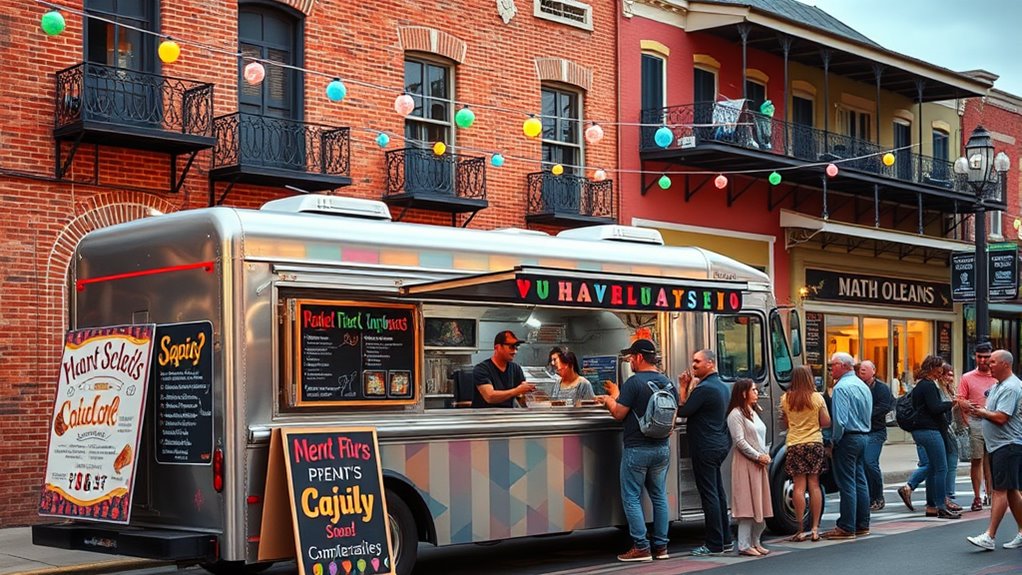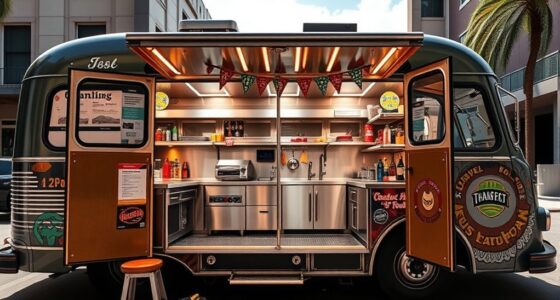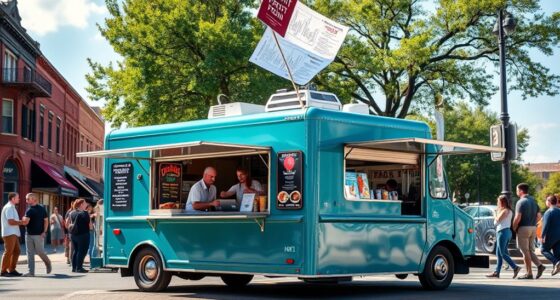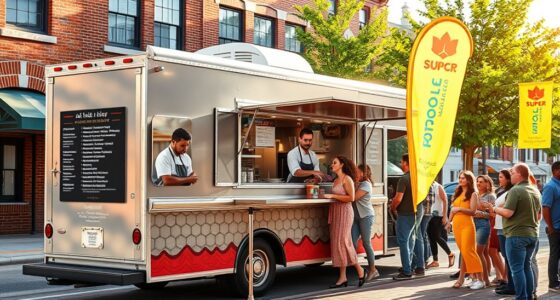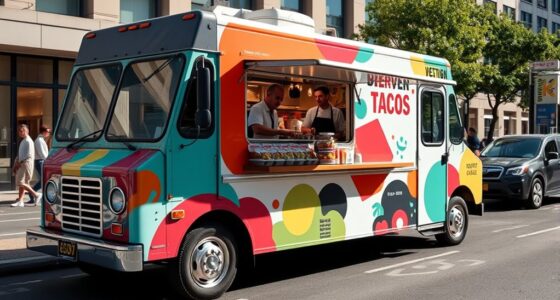To open a food truck in New Orleans, you need to secure city permits, including a food truck and occupational license, with only 100 permits available. Expect costs between $1,800 and $28,000 for permits and licensing, plus startup costs from $30,000 to $90,000. Choose high-traffic locations like festivals or busy neighborhoods, and confirm your vehicle meets safety standards. Develop a Cajun or Creole menu, promote via social media, and build community ties. Keep exploring to learn more about thriving in this vibrant food scene.
Key Takeaways
- Secure a city-issued food truck permit, occupational license, and pass health and fire safety inspections before operation.
- Budget $30,000–$90,000 for the truck, plus licensing fees ranging from $1,800 to $28,000, including event and commissary costs.
- Operate in designated food zones, avoid residential areas, and participate in festivals like Mardi Gras and Jazz Fest for visibility.
- Ensure trucks meet size regulations (max 26 ft long, 8 ft wide), pass safety inspections, and display valid permits visibly.
- Develop authentic Cajun/Creole menus, leverage social media marketing, and build community ties through local events and partnerships.
Navigating Permits and Licensing Requirements
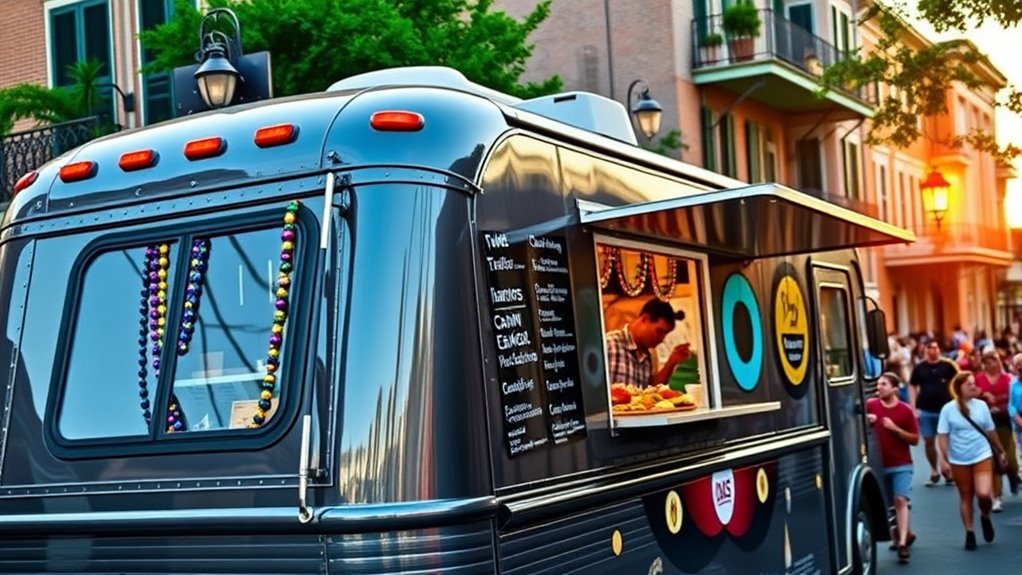
Navigating permits and licensing in New Orleans can seem complex, but understanding the requirements is vital for a smooth start. You’ll need to secure a city-issued food truck permit and an occupational license before operating. The city issues only 100 permits for mobile vendors, including carts and trucks, so applying early is essential. Your application must include vehicle registration, commercial liability insurance (minimum $500,000), driver’s licenses, and fire and health department inspections. The food truck’s size is limited to 26 feet long and 8 feet wide. Remember, the permit processing only begins after you submit your occupational license application. Be prepared to gather all necessary documents, and contact the Bureau of Revenue or Health Department if you have questions. Proper planning guarantees a smoother licensing process. The permit cap creates barriers for entrepreneurs, making early application even more critical to secure one of the limited permits.
Understanding Costs and Fee Structures
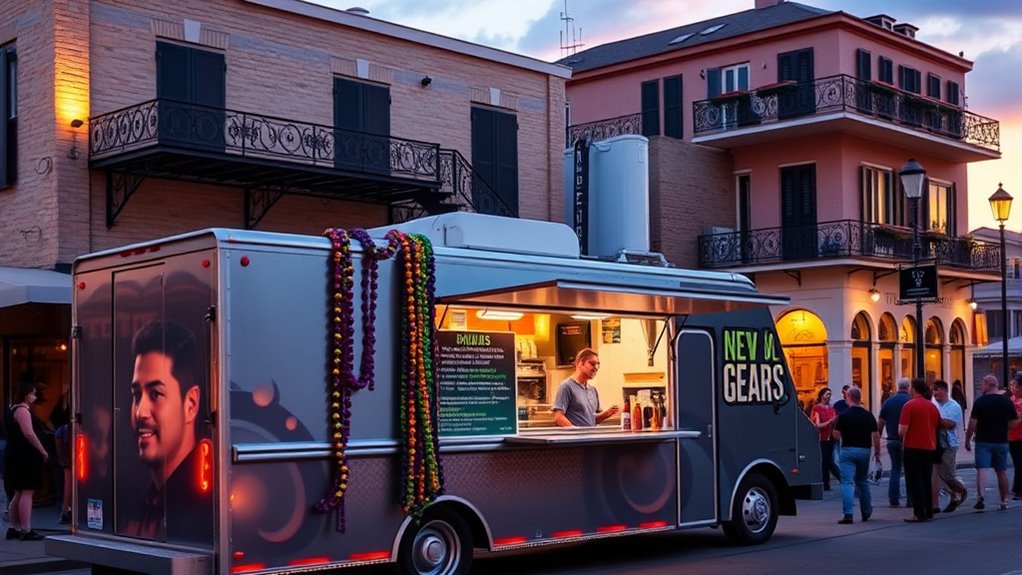
Understanding the costs involved in launching a food truck operation helps you plan your budget and avoid surprises. Startup costs vary widely, with trucks typically costing between $30,000 and $90,000 depending on size and equipment needs. Louisiana-specific equipment, like crawfish boilers or gumbo stations, can increase expenses. Leasing may lower upfront costs compared to buying. Besides the truck, consider expenses for branding, insurance, inventory, and technology. Permits and licensing fees in New Orleans can range from $1,800 to over $28,000, influenced by local regulations. Additional costs include event permits ($100–$400), commissary fees (~$1,000–$1,500/month), and operational expenses like fuel, maintenance, and waste management. Proper planning prevents unexpected financial strain.
Choosing Ideal Operating Locations
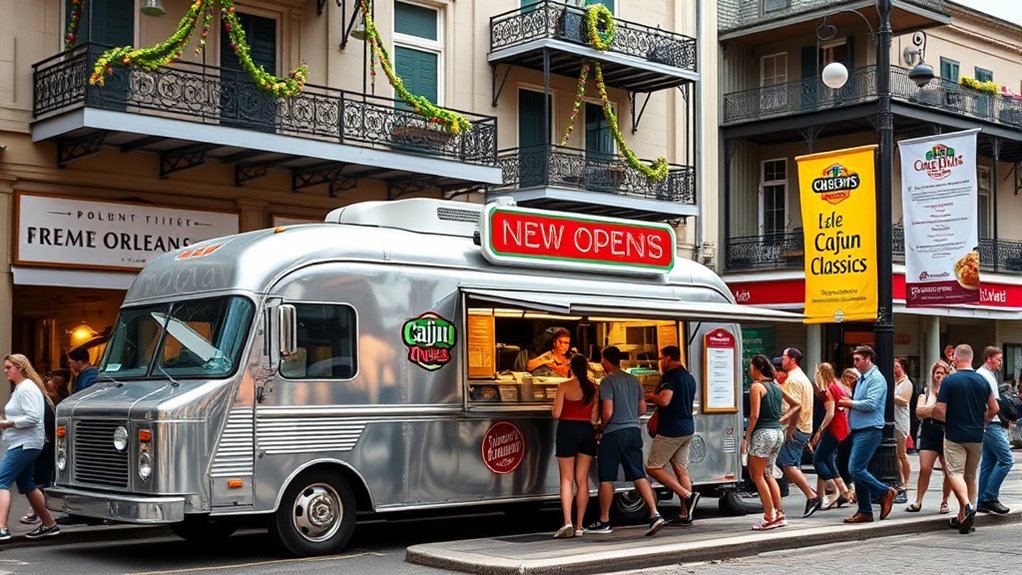
Choosing the right location is key to your food truck’s success in New Orleans. You need to operate within designated zones and consider high-traffic spots like event and festival areas. By focusing on these areas, you can maximize your sales while staying compliant with local regulations. Additionally, understanding content discoverability can help you tailor your location choices to attract more viewers and customers.
Designated Food Zones
Selecting the right location for your food truck is essential to staying compliant and attracting customers. You need to operate within designated food zones that align with local regulations. These zones typically include commercial, industrial, and some mixed-use areas, where permits are easier to obtain. Be mindful of restrictions near residential neighborhoods—at least 50 feet away—and avoid operating within 600 feet of restaurants, though city hall mentions a 200-foot limit, which can be confusing. Certain areas like the French Quarter and CBD are restricted unless you have specific permits. To stay compliant, verify your location using city online zoning tools and obtain all necessary permits and licenses before setting up shop. Additionally, understanding the established zoning regulations can help you identify the most suitable and lawful operating areas for your food truck.
Event and Festival Spots
Hosting your food truck at events and festivals can considerably boost visibility and sales, especially in a city like New Orleans that’s rich with cultural celebrations. Major festivals like the National Fried Chicken Festival, Beignet Fest, and Crescent City Blues & BBQ attract large crowds, providing prime opportunities for exposure. Locations such as Louis Armstrong Park and Old Lake Forest Plaza often host these events, offering ample space and organized vendor registration. Venues with live entertainment or family-friendly activities increase foot traffic and dwell time, boosting sales. Timing is vital—align your schedule with peak festival dates and weekends to maximize customer engagement. Remember to register in advance, comply with health permits, and leverage festival themes for marketing to make the most of these high-traffic spots. Attending festivals and events also allows for direct engagement with potential customers, helping build a loyal local following. Additionally, understanding the standardized signs and regulations used in these areas can help you navigate permits and safety requirements more effectively.
Meeting Vehicle and Equipment Standards
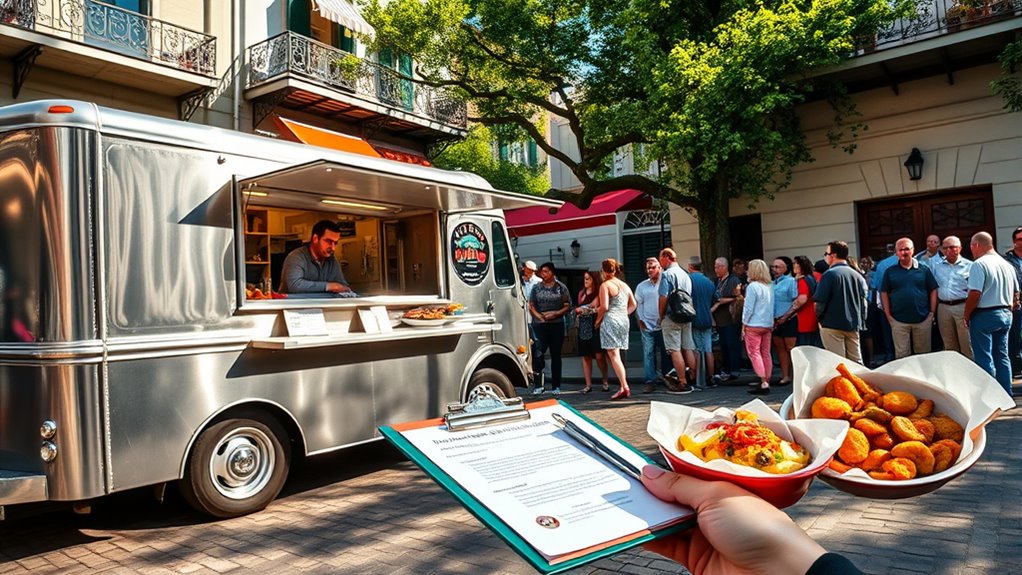
To operate legally in New Orleans, your food truck must meet specific size regulations, safety inspection standards, and insurance requirements. You need to guarantee your vehicle complies with city-mandated dimensions and passes all health and fire safety checks. Additionally, having proper insurance coverage protects you and your customers while fulfilling city licensing conditions. City-issued food truck permits are essential for legal operation and must be renewed annually to remain compliant. Understanding local health codes and safety standards can help prevent delays during the inspection process and ensure smooth operations.
Vehicle Size Regulations
In New Orleans, food trucks must adhere to specific vehicle size standards to qualify for permits, ensuring they meet safety and operational requirements. The maximum length allowed is 26 feet, and the width cannot exceed 8 feet. Only two-axle, self-propelled vehicles qualify; trailers and trucks with more axles are excluded. Although the city permits vehicles up to 35 feet in length, food trucks must stay within the stricter 26-foot limit. Height restrictions aren’t explicitly stated but must comply with general vehicle regulations. To operate legally, you should also remember: Updated browser support requirements—visitors to the city’s official licensing website are advised to use supported browsers like Google Chrome or Mozilla Firefox for seamless access. Vehicles must meet Louisiana axle weight and gross vehicle weight limits. All equipment and dimensions must comply with local ordinances. Vehicles require valid registration and insurance. Proper signage and permit display are mandatory.
Safety Inspection Requirements
Ensuring your food truck meets safety inspection standards is essential for legal operation and customer safety. You’ll need to verify that all cooking, refrigeration, and handwashing equipment meet detailed safety specifications, allowing proper food temperature control. The vehicle must pass inspections by authorities like the New Orleans Fire Department, confirming fire suppression systems, fire extinguishers, and safety equipment are installed and functional. Regular maintenance and servicing are mandatory to stay compliant. Visible, valid licenses and permits must be displayed on your truck at all times. Additionally, your wastewater and water supply systems must meet strict disposal and sanitation regulations. Inspection reports and documentation of safety checks are often required during routine inspections. Compliance involves routine inspections, documentation, and upkeep, ensuring your truck operates safely, efficiently, and within local health and fire safety standards. Maintaining a comprehensive safety plan can help streamline your compliance process and prepare you for inspections.
Insurance Coverage Standards
Are your food truck’s vehicle and equipment insurance policies aligned with Louisiana’s standards? Making sure your coverage meets state and local requirements is vital. You must have valid automobile insurance that covers your truck with adequate liability limits, often including the municipality as an insured. Your policy should also cover equipment, theft, and damage through inland marine coverage, especially for kitchen tools and appliances. Having proper insurance not only ensures compliance but also provides peace of mind in case of unforeseen incidents. Additionally, maintaining insurance documentation is crucial for inspections and proof of coverage during operations.
Key points to remember:
- Maintain continuous proof of insurance for registration and compliance.
- Name the city or state as an additional insured if required.
- Meet or exceed minimum coverage limits, typically $500,000 or more.
- Make certain your fire safety and sanitation equipment meet inspection standards, as insurers require adherence to safety protocols.
These measures help protect your investment and keep your operations compliant.
Developing a Menu That Appeals to Local Tastes
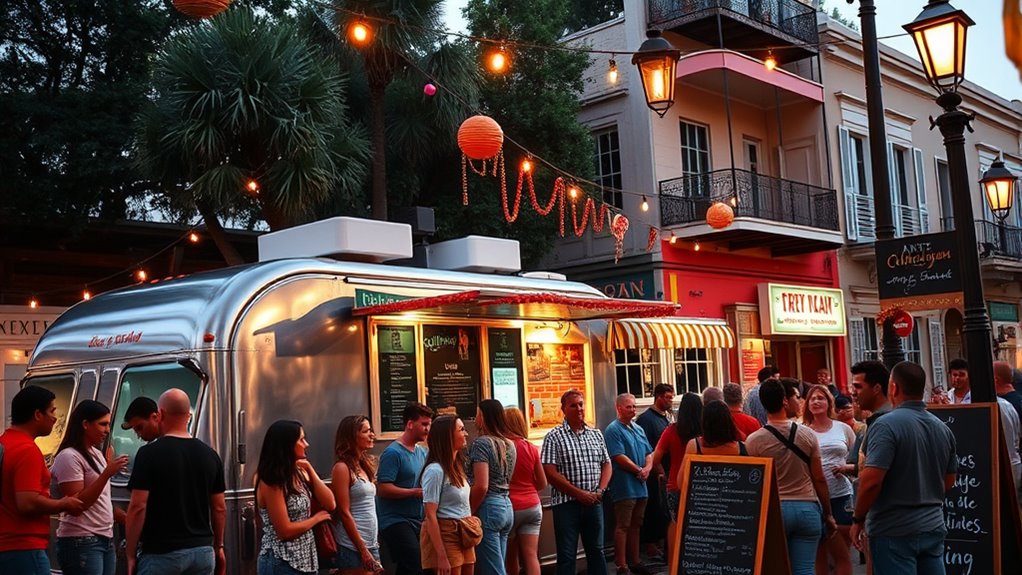
To create a menu that truly resonates with New Orleans locals, focus on authentic flavor profiles rooted in Cajun and Creole traditions. Use spices like paprika, cayenne, thyme, and garlic to build bold, layered flavors. Incorporate traditional proteins such as shrimp, andouille sausage, crawfish, chicken, and pork to match regional tastes. Balance spicy seafood dishes with creamy elements like smoked gouda grits or mac and cheese. Highlight smoky, savory favorites like jambalaya, gumbo, and étouffée, ensuring authenticity. Include crowd-pleasers such as BBQ shrimp pasta or muffuletta sandwiches. Offer seafood-heavy options, hearty carbs, and comfort food combos. Remember to mark vegetarian, vegan, and gluten-free choices clearly and use evocative descriptions to entice customers while celebrating Louisiana’s culinary heritage. Additionally, utilizing the food trucks map available on BFT can help you identify popular locations to maximize visibility and foot traffic for your menu offerings. Incorporating local ingredients can further enhance authenticity and appeal to regional tastes.
Effective Marketing and Community Engagement Strategies

Creating a menu that appeals to local tastes sets the foundation for your food truck’s success, but effective marketing and community engagement are what truly build your presence in New Orleans. To stand out, leverage targeted Facebook ads to reach local food lovers and event-goers. Maintain active Instagram and Twitter accounts to share your location, specials, and deals, encouraging followers to spread the word. Develop an email newsletter to keep customers informed about truck updates and upcoming events. Additionally, foster community connections by partnering with local businesses for special events, participating in neighborhood fundraisers, and supporting festivals like Mardi Gras or Jazz Fest. Building relationships with other vendors and engaging with civic groups strengthens your reputation and embeds your truck into the fabric of the community. Incorporating local flavors into your menu can also resonate strongly with residents and visitors alike.
Frequently Asked Questions
How Long Does the Permit Approval Process Typically Take in New Orleans?
You’re probably wondering how long the permit approval takes in New Orleans. Typically, it ranges from 2 to 6 weeks, depending on the permit type and application completeness. Food vendor permits usually take about 4 to 6 weeks because of extra health reviews. To avoid delays, make sure your application is thorough and submit all required documents early, ideally 60 days before your planned launch.
Are There Any Restrictions on Operating During Specific Hours or Days?
You might think the rules are strict, but they’re designed to keep New Orleans thriving! You can operate your food truck between 6 a.m. and 8 p.m., with possible extensions through permits. You’re limited to four hours in one spot and can’t operate within 600 feet of restaurants or in certain districts without special approval. Plus, you’re only allowed up to five days a week in non-residential areas.
Can I Operate in Private Events Without City Permits?
You can’t operate at private events in New Orleans without city permits, especially if the event is in a restricted or regulated area. Even on private property, you need a special event permit if the event requires it. You must also have proper insurance, vehicle registration, and health inspections. Skipping permits risks fines and shutdowns, so always check with city officials to guarantee you’re compliant before serving at private events.
What Are the Penalties for Operating Without Proper Licensing?
If you operate a food truck without proper licensing, you risk hefty fines, immediate shutdowns, and confiscation of your vehicle. City officials can cite you, remove your truck from locations, and deny future permits. Operating unlicensed also exposes you to legal liabilities, insurance issues, and damage to your reputation. Violating health and safety regulations can lead to health inspections, closures, or even legal action. Staying compliant guarantees your business runs smoothly and avoids penalties.
How Often Do Food Truck Permits Get Renewed or Updated?
You’re looking at a permit renewal process that’s as relentless as a Mardi Gras parade—every year without fail. You’ll need to resubmit paperwork, pass fire and health inspections, and pay fees like clockwork. It’s a yearly ritual that keeps your food truck legally rolling and compliant with city rules, ensuring you avoid fines or shutdowns. Think of it as your annual ticket to keep the culinary adventure alive in New Orleans!
Conclusion
Starting your food truck journey in New Orleans is like planting a seed—you’ll need to nurture it with permits, location choices, and a menu that resonates. Stay tuned into the community and market your truck like a lively parade, drawing people in with your unique flavor. With dedication and passion, your food truck can blossom into a beloved fixture on the streets, serving up the spirit of New Orleans one delicious bite at a time.
